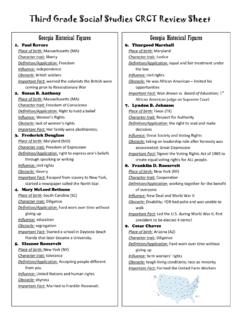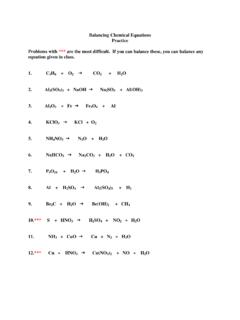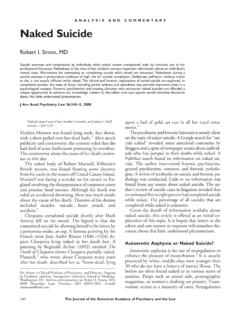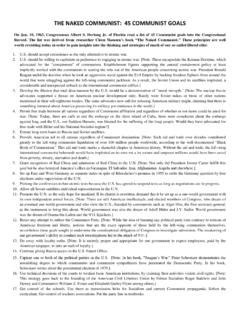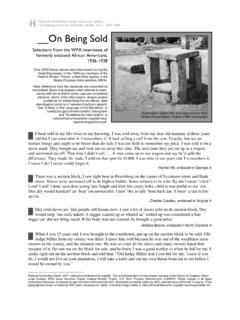Transcription of Who feeds Paris?
1 CHAPTER 1 The Power of Markets: Who feeds paris ? In 1989, as the Berlin Wall was toppling, Douglas Ivester, head of Coca-Cola Europe (and later CEO), made a snap decision. He sent his sales force to Berlin and told them to start passing out Coke. Free. In some cases, the Coca-Cola representatives were literally passing bottles of soda through holes in the Wall. He recalls walking around Alexanderplatz in East Berlin at the time of the upheaval, try-ing to gauge whether there was any recognition of the Coke brand. "Everywhere we went, we asked people what they were drinking, and whether they liked Coca-Cola. But we didn't even have to say the name!
2 We just shaped our hands like the bottle, and people under-stood. We decided we would move as much Coca-Cola as we could, as fast as we could even before we knew how we would get paid."1 Coca-Cola quickly set up business in East Germany, giving free coolers to merchants who began to stock the "real thing." It was a money-losing proposition in the short run; the East German currency was still worthless scraps of paper to the rest of the world. But it was a brilliant business decision made faster than any government body could ever hope to act. By 1995, per capita consumption of Coca-Cola in the former East Germany had risen to the level in West Germany, which was already a strong market.
3 4 naked economics In a sense, it was Adam Smith's invisible hand passing Coca-Cola through the Berlin Wall. Coke representatives weren't undertaking any great humanitarian gesture as they passed beverages to the newly liberated East Germans. Nor were they making a bold statement about the future of communism. They were looking after business expand-ing their global market, boosting profits, and making shareholders happy. And that is the punch line of capitalism: The market aligns incentives in such a way that individuals working for their own best interest passing out Coca-Cola, spending years in graduate school, planting a field of soybeans, designing a radio that will work in the shower leads to a thriving and ever-improving standard of living for most (though not all) members of society.
4 Economists sometimes ask, "Who feeds paris ?" a rhetorical way of drawing attention to the mind-numbing array of things happening every moment of every day to make a modern economy work. Somehow the right amount of fresh tuna makes its way from a fishing fleet in the South Pacific to a restaurant on the Rue de Rivoli. A neighborhood fruit vendor has exactly what his customers want every morning from cof-fee to fresh papayas even though those products may come from ten or fifteen different countries. In short, a complex economy involves bil-lions of transactions every day, the vast majority of which happen with-out any direct government involvement. And it is not just that things get done; our lives grow steadily better in the process.
5 It is remarkable enough that we can now shop for a television twenty-four hours a day from the comfort of our own homes; it is equally amazing that in 1971 a twenty-five-inch color television set cost an average worker 174 hours of wages. Today, a twenty-five-inch color television set one that is more dependable, gets more channels, and has better reception costs the average worker about twenty-three hours of pay. If you think that a better, cheaper television set is not the best measure of social progress (a reasonable point, I concede), then per-haps you will be moved by the fact that, during the twentieth century, American life expectancy climbed from forty-seven years to seventy-The Power of Markets 5 seven, infant mortality plunged by 93 percent, and we wiped out or gained control over diseases such as polio, tuberculosis, typhoid, and whooping Our market economy deserves a lot of the credit for that progress.
6 There is an old Cold War story about a Soviet official who visits an American pharmacy. The brightly lit aisles are lined with thou-sands of remedies for every problem from bad breath to toe fungus. "Very impressive," he says. "But how can you make sure that every store stocks all of these items?" The anecdote is interesting because it betrays a total lack of understanding of how a market economy works. In America, there is no central authority that tells stores what items to stock, as there was in the Soviet Union. Stores sell the products that people want to buy, and, in turn, companies produce items that stores want to stock.
7 The Soviet economy failed in large part because government bureaucrats directed everything, from the number of bars of soap produced by a factory in Irktusk to the number of university students studying electrical engineering in Moscow. In the end, the task proved overwhelming. Of course, those of us accustomed to market economies have an equally poor understanding of communist central planning. I was once part of an Illinois delegation visiting Cuba. Because the visit was licensed by the government, each member of die delegation was allowed to bring back $100 worth of Cuban merchandise, including cigars. Having been raised in the era of discount stores, we all set out looking for the best price on Cohibas so that we could get the most bang for our $100 allowance.
8 After several fruitless hours, we discov-ered the whole point of communism: The price of cigars was the same everywhere. There is no competition between stores because there is no profit as we know it. Every store sells cigars and everything else for that matter at whatever price Fidel Castro (or his brother Raul) tells them to. And every shopkeeper selling cigars is paid the govern-ment wage for selling cigars, which is unrelated to how many cigars he or she sells. 6 naked economics Gary Becker, a University of Chicago economist who won the Nobel Prize in 1992, has noted (borrowing from George Bernard Shaw) that "economy is the art of making the most of life.
9 " Economics is the study of how we do that. There is a finite supply of everything worth hav-ing: oil, coconut milk, perfect bodies, clean water, people who can fix jammed photocopy machines, etc. How do we allocate these things? Why is it that Bill Gates owns a private jet and you don't? He is rich, you might answer. But why is he rich? Why does he have a larger claim on the world's finite resources than everyone else? At the same time, how is it possible in a country as rich as the United States a place where Alex Rodriguez can be paid $275 million to play baseball that one in five children is poor or that some adults are forced to rummage through garbage cans for food?
10 Near my home in Chicago, the Three Dog Bakery sells cakes and pastries only for dogs. Wealthy profession-als pay $16 for birthday cakes for their pets. Meanwhile, the Chicago Coalition for the Homeless estimates that fifteen thousand people are homeless on any given night in that same city. These kinds of disparities grow even more pronounced as we look beyond the borders of the United States. Three-quarters of the people in Chad have no access to clean drinking water, let alone pastries for their pets. The World Bank estimates that half of the world's popula-tion survives on less than $2 a day. How does it all work or, in some cases, not work?
